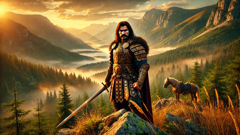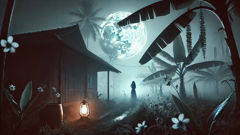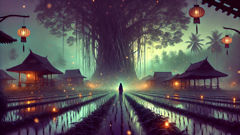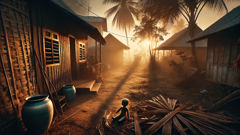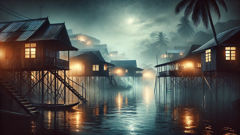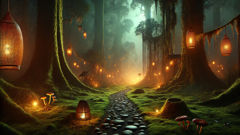Introduction
In the heart of the Balkans, among rolling green hills and mighty mountains that catch the sunlight in golden waves, tales have echoed for centuries of a hero whose name stirs pride and wonder: Krali Marko. The name resounds in the stone villages and across the wild rivers of North Macedonia, carried by the wind over meadows and forests where history and myth entwine. To the people of this land, Krali Marko is more than a memory—he is the living spirit of courage, justice, and resilience, a prince with the strength of a dozen men and a heart that beat fiercely for his people. His story, woven into the fabric of South Slavic epic poetry, is one of struggle and hope, of impossible battles and quiet moments beneath the stars. He is the champion who rode his faithful horse Šarac across impossible distances, lifting boulders and bending iron with ease, but also the gentle soul who loved the fields and streams of his homeland. In an era when the Ottoman Turks threatened the very heart of the Balkans, Krali Marko stood between the conquerors and his people, a figure of defiance, wits, and legendary power. Yet, beneath the heroic deeds and supernatural gifts, he remained a man burdened by fate, torn between the world of mortals and the realm of gods and spirits. The story of Krali Marko is not just an adventure—it is a window into a culture’s soul, a reflection of dreams and fears, of longing for freedom, and belief in heroes who rise when all hope seems lost. As the sun sets behind the Macedonian mountains and the ancient stones whisper their secrets, the legend of Krali Marko endures—forever inviting us to believe in courage, justice, and the enduring strength of the human heart.
I. The Birth of a Hero: Destiny Forged in Shadow and Light
The legend of Krali Marko begins not with fanfare, but with a world trembling at the edge of darkness. The 14th century was a time of turmoil in the Balkans, as the Ottoman Turks advanced relentlessly, casting a shadow over towns and villages. In the small town of Prilep, nestled between craggy hills and ancient ruins, the people whispered prophecies of a child born beneath a blood-red moon—a child destined to shield them from the gathering storm.
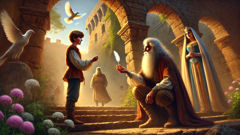
Marko Mrnjavcevic was born to King Vukašin, the lord of Prilep, and Queen Jevrosima, whose wisdom and gentle spirit shaped Marko’s early years. From infancy, it was clear he was no ordinary boy. Stories tell of how, as a toddler, he lifted rocks no man could budge and bent iron rods like twigs. He’d wander the meadows and forests, befriending shepherds, helping the poor, and learning the ways of the land. The old women of the village swore he was blessed by saints and protected by the forest spirits. As he grew, so did his strength and sense of justice. Marko’s days were spent training in the arts of war and the wisdom of peace. His father, stern but fair, taught him swordplay and strategy, while his mother guided him in kindness and humility. Every night, Marko listened to tales of heroes and ancient battles, vowing that he’d serve his people when the time came.
One fateful spring, a mysterious stranger arrived at their castle—a wild-haired hermit from the mountains. He carried a staff made from lightning-blasted oak and spoke in riddles. After a long conversation with Queen Jevrosima, the hermit asked to see young Marko. He gazed into the boy’s eyes and, with a grave nod, proclaimed, “This child carries the weight of kingdoms. His hand will break chains, but his heart must remain unbroken.” That night, the hermit vanished, leaving behind a single white feather—a symbol, the people said, of divine favor.
The years rolled by. Marko’s feats grew legendary. He once stopped a runaway ox-cart with a single hand and rescued a band of children trapped by a landslide. But power alone could not shield him from sorrow. When Marko was still young, the Ottomans stormed Prilep. King Vukašin fell in battle, and the city’s proud walls crumbled. Marko was forced to flee, his heart burning with grief and rage, his mother’s last words echoing in his mind: “Hold fast to honor. Never let hatred rule you.”
Exile was bitter. For months, Marko wandered the wilds, hiding in caves and sleeping beneath ancient oaks. But it was here that his true transformation began. As he grappled with loss and anger, he discovered an inner strength—one born not only from muscle but from compassion. He began to see his struggle as part of something greater, a test that would forge him into the hero his people needed. One night, as a storm raged and lightning split the sky, Marko knelt in prayer on a lonely hilltop. Legend says that a voice spoke from the thunder: “Rise, Krali Marko. Protector of the land. The time is near.”
With dawn came resolve. Marko took up his father’s sword, called for his faithful steed Šarac—whose hoofprints were said to leave springs of water where they struck rock—and set out to gather allies. His journey had begun.
II. Feats Beyond Mortal Men: The Rise of Krali Marko
Krali Marko’s legend grew with every step he took across Macedonia and beyond. As the Ottoman yoke tightened, villagers shared tales of his impossible strength. Some said he could uproot trees with a single tug; others swore he could leap mountain gorges that would terrify even wolves. Wherever Marko passed, hope blossomed anew.
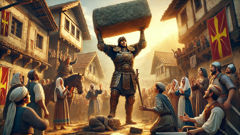
His most faithful companion was Šarac, a horse as remarkable as his master. White as mountain snow with an inky mane and tail, Šarac could speak in riddles and run faster than the wind. The two became inseparable—Šarac would nudge Marko awake at dawn, and together they would ride across rivers and plains, righting wrongs and lending help where it was most needed.
It was during this period that Marko’s greatest feats took place. In one village, he faced a cruel Ottoman tax collector who demanded gold from starving peasants. Marko challenged the official to a contest of strength: whoever could lift a massive stone from the village square would claim the right to collect or forgive the tax. The Ottoman and his soldiers laughed, but Marko easily hoisted the boulder overhead, tossing it into the nearby river. The people cheered as he declared their debts forgiven.
In another tale, Marko encountered a fearsome giant—Djemo the Mountaineer—who terrorized the highlands, blocking travelers and demanding tribute. The battle between Marko and Djemo shook the very earth. Fists thundered like drums, trees splintered, and wild animals fled in terror. But Marko, guided by wit as much as might, lured Djemo into a narrow ravine, trapping him and forcing him to swear never to harm innocents again.
As word spread, Marko drew loyal companions to his side: Miloš, a cunning trickster; Vidosava, a healer with knowledge of ancient herbs; and Bojan, a former bandit who had changed his ways. Together, they formed a small band of rebels who roamed the hills, striking at Ottoman patrols and freeing prisoners from dungeons. By night, they lit secret fires in mountain caves and planned daring raids. By day, they blended into the humble lives of shepherds and woodcutters, always listening for cries of distress.
Despite his power, Marko remained humble. He’d share his last piece of bread with a beggar or mend a broken wagon for a widow. Elders marveled at how he’d listen to their stories by the fire, never boasting of his own deeds. Children adored him, running to greet Šarac and daring each other to touch the hero’s mighty sword.
Yet Marko’s path was never free from sorrow. The Ottomans sent assassins and spies, seeking to crush this symbol of hope. Marko survived many ambushes thanks to Vidosava’s healing potions and Šarac’s uncanny sense for danger. Still, he lost friends along the way—Bojan fell in a skirmish defending a mountain pass, and Marko mourned him as a brother.
Through it all, Krali Marko’s legend grew. Songs spread from hearth to marketplace, from shepherd’s flute to weaver’s loom: the hero who would not yield, whose laughter rang louder than thunder, whose tears watered the wildflowers on forgotten graves. His courage was a beacon, and his strength a promise: so long as Krali Marko stood, Macedonia would not fall.
III. Love, Loss, and the Weight of Destiny
Not all battles are fought with swords. As Krali Marko’s fame spread, he discovered that courage often means facing the burdens of the heart. For even the strongest hero is not immune to love, sorrow, and doubt.
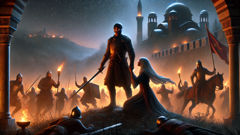
In the quiet village of Treskavec, beneath the shadow of a lonely monastery, Marko met Elena—a weaver whose laughter danced like wind-chimes and whose eyes sparkled with wisdom. She mended his torn cloak one autumn evening as he sheltered from a storm. Over time, her gentle words soothed his scars, and her songs offered respite from his restless journeys. Marko found peace in her presence, lingering by her side whenever his duties allowed.
But fate’s designs are never simple. The Ottomans, seeking to break Marko’s spirit, kidnapped Elena during a midnight raid. They threatened her life in exchange for Marko’s surrender. Torn between love and duty, Marko wrestled with despair. He sought guidance from the monastery’s wise old abbot, who told him, “A true hero cannot be chained by fear or grief. Let your love be your shield.”
Marko gathered his companions for a desperate rescue. Under a moonless sky, they infiltrated the Ottoman camp, outwitting sentries with Miloš’s cunning and Vidosava’s potions. Marko’s strength cut through iron gates, and his roar scattered the guards. He found Elena bound but unbroken, her courage shining in her eyes even as danger closed in. Together they fled, fighting side by side until dawn, when the camp lay in ruins behind them.
For a while, happiness returned. Marko and Elena shared quiet moments among wildflowers and ancient stones, dreaming of a future free from war. But as the Ottoman grip tightened, Marko was forced to choose again between personal happiness and his people’s freedom. He could not abandon his mission; Elena understood. She gave him a woven sash as a token of hope—a promise that love endures even when parted by fate.
Marko’s burdens grew heavier with every passing year. He saw villages burned, friends lost, and the old ways threatened by a relentless new order. Doubt gnawed at his heart: could even he turn back the tide? In his darkest moments, he’d climb the highest peak at dusk and call to the spirits of his ancestors. Sometimes a falcon would circle overhead; sometimes a voice would whisper on the wind: “Do not falter, Krali Marko. Macedonia endures through you.”
These trials shaped him more than any battle. They forged a hero not just of muscle but of soul—a man whose strength came from compassion as much as power. The people sensed this. They did not merely cheer his victories; they shared in his pain and his hope. So the legend of Krali Marko grew not only as a story of war but as a song of love and sacrifice that echoed across generations.
Conclusion
Krali Marko’s legend did not end with a single victory or defeat. Some say he vanished into the mountains, waiting to return in his people’s hour of need. Others claim he lives on in every act of courage and kindness across Macedonia. To this day, children leap over boulders and invoke his name for luck; elders recall his wisdom when faced with hard choices. The rivers that wind through ancient valleys, the forests that shelter hidden springs, even the ruined castles that crown the hills—each holds a memory of the hero who would not yield.
Marko’s story is more than a tale of strength or war; it is the heartbeat of a nation—a reminder that even in darkness, hope can blaze like sunrise over the mountains. His deeds shaped the destiny of the Balkans and inspired generations to fight for justice, freedom, and love. As long as the land endures and songs are sung beside Macedonian hearths, Krali Marko’s epic will never truly fade. His courage is our inheritance, his compassion our guide, and his legend a promise: so long as we remember, heroes walk among us still.

